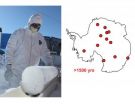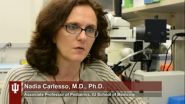(Press-News.org) Biologists at UC San Diego have solved a long-standing mystery concerning the way plants reduce the numbers of their breathing pores in response to rising carbon dioxide levels in the atmosphere.
In a paper published in this week's early online edition of Nature, they report the discovery of a new genetic pathway in plants, made up of four genes from three different gene families that control the density of breathing pores—or "stomata"—in plant leaves in response to elevated CO2 levels.
Their discovery should help biologists better understand how the steadily increasing levels of CO2 in our atmosphere (which last spring, for the first time in recorded history, remained above 400 parts per million) are affecting the ability of plants and economically important crops to deal with heat stress and drought. It could also provide agricultural scientists with new tools to engineer plants and crops that can deal with droughts and high temperatures like those now affecting the Southwestern United States.
"For each carbon dioxide molecule that is incorporated into plants through photosynthesis, plants lose about 200 hundred molecules of water through their stomata," explains Julian Schroeder, a professor of biology who headed the research effort. "Because elevated CO2 reduces the density of stomatal pores in leaves, this is, at first sight beneficial for plants as they would lose less water. However, the reduction in the numbers of stomatal pores decreases the ability of plants to cool their leaves during a heat wave via water evaporation. Less evaporation adds to heat stress in plants, which ultimately affects crop yield."
Schroeder is also co-director of a new research entity at UC San Diego called "Food and Fuel for the 21st Century," which is designed to apply basic research on plants to sustainable food and biofuel production.
"Our research is aimed at understanding the fundamental mechanisms and genes by which CO2 represses stomatal pore development," says Schroeder. Working in a tiny mustard plant called Arabidopsis, which is used as a genetic model and shares many of the same genes as other plants and crops, he and his team of biologists discovered that the proteins encoded by the four genes they discovered repress the development of stomata at elevated CO2 levels.
Using a combination of systems biology and bioinformatic techniques, the scientists cleverly isolated proteins, which, when mutated, abolished the plant's ability to respond to CO2 stress. Cawas Engineer, a postdoctoral scientist in Schroeder's lab and the first author of the study, found that when plants sense atmospheric CO2 levels rising, they increase their expression of a key peptide hormone called Epidermal Patterning Factor-2, EPF2.
"The EPF2 peptide acts like a morphogen which alters stem cell character in the epidermis of growing leaves and blocks the formation of stomata at elevated CO2," explains Engineer.
Because other proteins known as proteases are needed to activate the EPF2 peptide, the scientists also used a "proteomics" approach to identify a new protein that they called CRSP (CO2 Response Secreted Protease) which, they determined, is crucial for activating the EPF2 peptide.
"We identified CRSP, a secreted protein, which is responsive to atmospheric CO2 levels," says Engineer. "CRSP plays a pivotal role in allowing the plant to produce the right amount of stomata in response to the concentration of CO2 in the atmosphere. You can imagine that such a 'sensing and response' mechanism involving CRSP and EPF2 could be used to engineer crop varieties which are better able to perform in the current and future high CO2 global climate where fresh water availability for agriculture is dwindling."
The discoveries of these proteins and genes have the potential to address a wide range of critical agricultural problems in the future, including the limited availability of water for crops, the need to increase water use efficiency in lawns as well as crops and concerns among farmers about the impact heat stress will have in their crops as global temperatures and CO2 levels continue to rise.
"At a time where the pressing issues of climate change and inherent agronomic consequences which are mediated by the continuing atmospheric CO2 rise are palpable, these advances could become of interest to crop biologists and climate change modelers," says Engineer.
INFORMATION:
Other scientists who participated in the research effort were UC San Diego biologists Majid Ghassemian and Honghong Hu, as well as Scott Peck and Jeffrey Anderson at the University of Missouri at Columbia.
Their study was supported by grants from the National Science Foundation, the National Institutes of Health and the U.S Department of Energy's Division of Chemical Sciences, Geosciences, and Biosciences in the Office of Basic Energy Sciences.
Discovery provides insights on how plants respond to elevated CO2 levels
2014-07-06
ELSE PRESS RELEASES FROM THIS DATE:
Rewriting the history of volcanic forcing during the past 2,000 years
2014-07-06
RENO – A team of scientists led by Michael Sigl and Joe McConnell of Nevada's Desert Research Institute (DRI) has completed the most accurate and precise reconstruction to date of historic volcanic sulfate emissions in the Southern Hemisphere.
The new record, described in a manuscript published today in the online edition of Nature Climate Change, is derived from a large number of individual ice cores collected at various locations across Antarctica and is the first annually resolved record extending through the Common Era (the last 2,000 years of human history).
"This ...
Global toolkit to diagnose menopause
2014-07-06
Created at Monash University, the world's first toolkit is designed for GPs to use with women from the age of 40. Thought to be the first of its kind, researchers say the toolkit has the potential to help manage menopausal conditions for women globally.
The Practitioner Toolkit for Managing the Menopause, which includes a diagnostic tool, as well as a compendium of approved hormone therapies, is published today in the journal, Climacteric.
Led by Professor Susan Davis, the research team from the School of Public Health and Preventative Medicine, combined existing research ...
The Lancet: Sierra Leone researchers call for improved health surveillance and communication around Ebola crisis
2014-07-05
Researchers working in Sierra Leone today [Saturday 5 July] suggest priority actions needed to tackle the ongoing Ebola crisis in West Africa. In a letter to The Lancet, the researchers call for improvements in access to diagnostic technologies and health-care resources, as well as improved disease surveillance and health communication.
At present, there is little incentive for patients to seek professional diagnosis of suspected Ebola, say the authors, with most people with febrile (fever-causing) illnesses in Sierra Leone treated at home, and the true extent of the ...
The Lancet: New trial suggests cheaper drugs for common heart attack procedure could improve outcomes and save health budgets millions
2014-07-05
A new study published in The Lancet compares outcomes for two drugs used to prevent blood clot formation during emergency heart attack treatment. The study suggests that use of one of the drugs, heparin, could result in improved outcomes (such as a reduced rate of repeat heart attacks), compared to the other drug tested, bivalirudin, which is in widespread use in high-income countries, and is around 400 times more expensive than heparin.
The results of the HEAT-PPCI trial suggest that systematic use of heparin rather than bivalirudin after primary percutaneous coronary ...
Association found between high cholesterol and breast cancer
2014-07-04
This news release is available in Spanish.
Barcelona, 4 July 2014: An association between high blood cholesterol and breast cancer has been found in a study of more than 1 million patients over a 14 year time period in the UK. The research will be presented today at Frontiers in CardioVascular Biology (FCVB) 2014 in Barcelona, Spain. The meeting is organised by the Council on Basic Cardiovascular Science of the European Society of Cardiology (ESC) in collaboration with 13 European cardiovascular science societies.
http://spo.escardio.org/SessionDetails.aspx?eevtid=65&sessId=13301&subSessId=3494
Dr ...
First evidence for painless atrial fibrillation treatment
2014-07-04
Barcelona, 4 July 2014: The first evidence for a shockless treatment for atrial fibrillation (AF) will be presented today at Frontiers in CardioVascular Biology (FCVB) 2014 in Barcelona, Spain. The meeting is organised by the Council on Basic Cardiovascular Science of the European Society of Cardiology (ESC) in collaboration with 13 European cardiovascular science societies. http://spo.escardio.org/SessionDetails.aspx?eevtid=65&sessId=13104
Dr Brian O. Bingen, first author, said: "AF is the most common cardiac arrhythmia. Symptoms range from the feeling of fish flapping ...
Effects of conflict on women's reproductive health need to be managed sensitively
2014-07-04
Clinicians need to be sensitive and aware of the unique challenges of women's reproductive health needs in times of conflict, suggests a new review published today (4 July) in The Obstetrician & Gynaecologist (TOG).
Approximately 1.5 billion people are currently living in countries affected by conflict, fragility or large-scale violence. Women and children account for approximately 75% of those displaced by conflict and roughly 20% of those displaced are women of reproductive age and one in five will be pregnant.
This new review looks at how conflict can negatively ...
New discovery in living cell signaling
2014-07-03
A breakthrough discovery into how living cells process and respond to chemical information could help advance the development of treatments for a large number of cancers and other cellular disorders that have been resistant to therapy. An international collaboration of researchers, led by scientists with the U.S. Department of Energy (DOE)'s Lawrence Berkeley National Laboratory (Berkeley Lab) and the University of California (UC) Berkeley, have unlocked the secret behind the activation of the Ras family of proteins, one of the most important components of cellular signaling ...
Compounded outcomes associated with comorbid Alzheimer's disease & cerebrovascular disease
2014-07-03
LEXINGTON, Ky. (July 3, 2014) -- Researchers from the Sanders-Brown Center on Aging at the University of Kentucky have been able to confirm anecdotal information on patients with both Alzheimer's disease (AD) and cerebrovascular disease (CVD) using mouse models in two different studies.
The findings of these two studies, which were recently published in Acta Neuropathologica and Alzheimer's Research & Therapy, have potentially significant implications for patients with both disorders.
Both papers studied CVD in Alzheimer's disease mouse models using different lifestyle ...
Biochemical cascade causes bone marrow inflammation, leading to serious blood disorders
2014-07-03
VIDEO:
Like a line of falling dominos, a cascade of molecular events in the bone marrow produces high levels of inflammation that disrupt normal blood formation and lead to potentially deadly...
Click here for more information.
INDIANAPOLIS -- Like a line of falling dominos, a cascade of molecular events in the bone marrow produces high levels of inflammation that disrupt normal blood formation and lead to potentially deadly disorders including leukemia, an Indiana University-led ...




